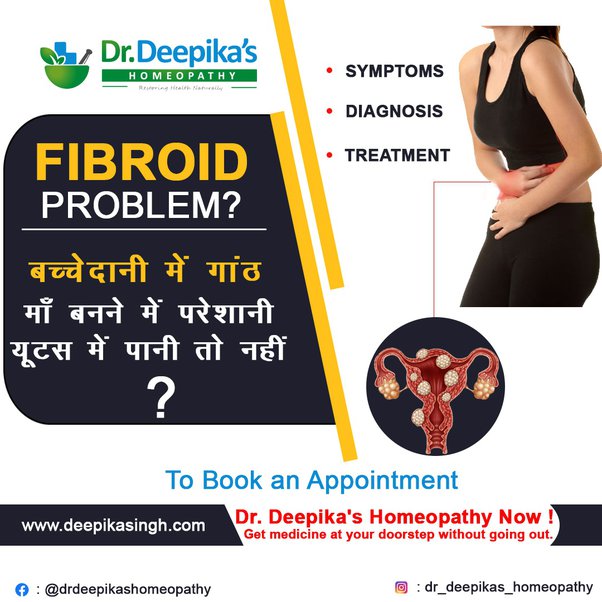
What Is a Fibroid and How Can They Be Cured?
Most women suffer from uterine-related health issues, and fibroids are among the most prevalent. Fibroids may impact a woman’s physical comfort, menstrual period, fertility, and general health. In this article, we will describe what a fibroid is? Discuss the types of fibroids, mention common symptoms of fibroids, learn about the causes of fibroids, and look into natural alternatives such as homeopathy treatment for fibroids to answer the crucial question: how can fibroids be cured?
What Is a Fibroid?
A fibroid is a non-cancerous growth that develops inside or around a woman’s uterus. Made up of muscle and fibrous tissue, fibroids can vary widely in size, number, and location within the uterus. Most women will not experience symptoms, but some will develop heavy periods, pelvic pain, or problems with fertility. Fibroids are likely to occur most often during reproductive ages and are hormone-dependent, like as estrogen and progesterone.
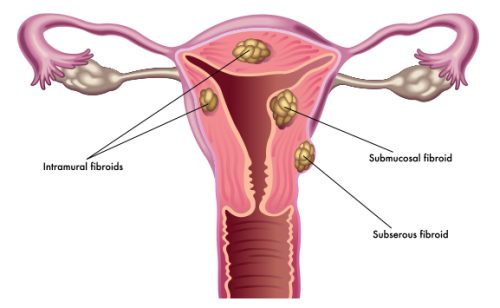
Types of Fibroids
Fibroids are classified based on their location within or around the uterus. Each category can have various symptoms and impact the body differently. The most prominent categories of fibroids are:
Intramural Fibroids
- Location: Within the muscular wall of the uterus.
- Symptoms: They may cause heavy menstrual bleeding, pelvic discomfort, and a feeling of pressure.
Subserosal Fibroids
- Location: Develops on the outer wall of the uterus, extending outward into the pelvic cavity.
- Symptoms: Can cause pressure in the pelvis, pain in the back, or trouble with adjacent organs such as the bladder or intestines, but usually do not impact menstruation.
Submucosal Fibroids
- Location: Below the inner uterine lining, invading into the uterine cavity.
- Symptoms: Tend to cause heavy menstrual bleeding, prolonged periods, and can impact fertility. Small submucosal fibroids can be a big problem.
Pedunculated Fibroids
- Location: Suspended from the uterus by a thin stalk, either within or outside the uterine wall.
- Symptoms: They may cause sharp, stabbing pain if twisted. They can form inside or outside the uterus, connected by a slender stalk.
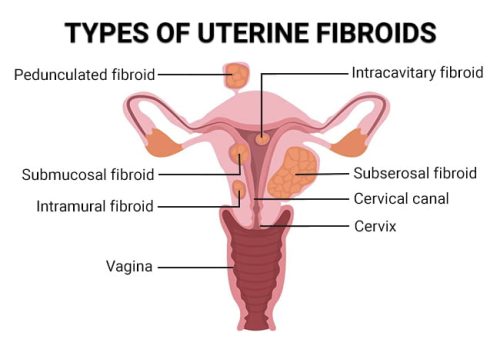
Symptoms of Fibroids
Symptoms of fibroids may differ from individual to individual. There are women who experience no symptoms at all, and some women may experience discomfort or face problems. The general symptoms are:
- Heavy or prolonged periods
- Pelvic pressure or pain
- Swelling or bloating in the lower abdomen
- Frequent need to urinate
- Constipation
- Sexual pain
- Lower abdominal pain
- Trouble getting pregnant or staying pregnant
Symptoms can vary in severity based on the size, number, and location of the fibroids.
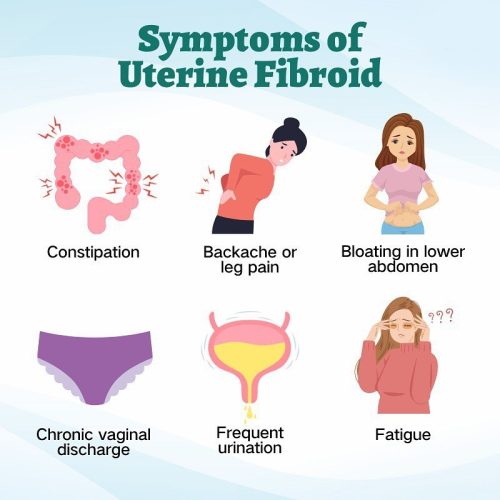
Causes of Fibroids
The specific reasons why fibroids occur are not known, but some factors are thought to be involved in their formation:
Genetic Factors
Fibroids can be hereditary. If fibroids run in your family, particularly in your mother or sister, you’re at a higher risk of developing them. Genetics plays a significant role in when and how fibroids develop.
Age
Women in their 30s and 40s are at greater risk of developing fibroids, as they are most common during reproductive years and tend to decrease after menopause.
Ethnicity
Fibroids are more common in African-American women, who may also experience more intense symptoms compared to women of other races.
Lifestyle Factors
Obesity, hypertension, and poor diet (particularly diets rich in red meat and low in green vegetables) may enhance the risk of fibroid formation.
Vitamin D Deficiency
Low levels of vitamin D have been implicated by some studies as being associated with fibroid growth.
Other Factors
Early menarche, insulin levels, and environmental pollutants may also contribute to fibroid formation.
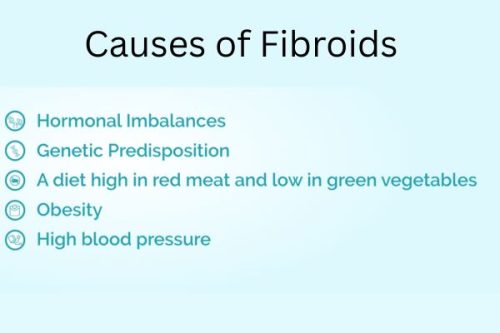
How Can Fibroids Be Cured?
For treatment, most women wonder: Can fibroids be cured? This depends on size, number, and severity. Let’s see what can be done:
- Watchful Waiting
In case of small fibroids and no symptoms, physicians might recommend keeping them under observation with frequent check-ups.
- Lifestyle Changes
A healthy weight, balanced diet, stress management, and regular exercise can control the growth of fibroids and relieve symptoms.
- Medicines
Physicians may prescribe medication to manage excessive bleeding or shrink the fibroids temporarily. However, medicines have side effects and do not cure fibroids for life.
- Homeopathy Treatment for Fibroids
For females who seek a natural, non-surgical, and long-term remedy, homeopathic treatment for fibroids is a good option. Homeopathy treats fibroids with plant and natural medicines to trigger the healing energy of the body. It treats the cause of the disease, i.e., hormonal imbalance or stress, and balances the system.
Homeopathic Remedies for Fibroids
Homeopathic remedies for fibroids naturally shrink growths, relieve pain and heavy bleeding, and restore hormonal balance—without surgery. Treatment is gentle and personalized.
- Calcarea Carbonica: For those women who feel weak, perspire easily, and become too heavy. It aids in coping with heavy menses and weakness.
- Thuja Occidentalis: Ideal for women with fibroids and recurrent infections or held-back discharges.
- Lachesis: Suitable for fibroids that cause severe pain, particularly when symptoms worsen before menstruation.
- Sepia: Ideal for women who feel a bearing-down sensation in the pelvis, along with mood swings and irregular cycles.
- Pulsatilla: Ideal for emotional and sensitive women dealing with changing symptoms and irregular menstrual cycles.
Disclaimer
Information on homeopathy treatment for fibroids is intended for educational purposes only and should not replace professional medical advice. Results can vary, so it’s essential to consult a qualified health professional or homeopathic practitioner before treatment. Always seek medical attention, particularly in the case of severe symptoms or complications.
FAQs
Q. Do fibroids go away by themselves?
Yes, in a few cases, particularly post-menopause, fibroids might shrink or go away as the levels of hormones decrease.
Q. Do fibroids impact pregnancy?
Certain fibroids can impact fertility or create issues during pregnancy, depending on size and position.
Q. Do fibroids always require surgery?
No. Fibroids, in most cases, can be treated by natural remedies, homeopathy, or minor lifestyle changes.
Q. How long does treatment by homeopathy take?
Time varies from individual to individual, but regular treatment over a few months can yield encouraging results.
Consult with Dr. Deepika
Dr. Deepika, the best homeopathy doctor in Noida, is a seasoned doctor with expertise in fibroid treatment. Having extensive knowledge of the female reproductive system, she creates customized treatment programs that target the underlying causes of fibroids. Dr. Deepika applies natural healing techniques to alleviate symptoms and ensure long-term well-being, providing non-surgical, holistic treatment for women who want effective fibroid control.